Moving to Greece: Your Complete 2024 Relocation Guide
The pros and cons of moving to Greece are something that appeals to a lot of people. The whole concept of life in Greece sounds romantic and idyllic.
After all, who wouldn’t want to stay in Greece, spend their days lounging on paradisical white sand beaches, hanging out drinking Freddo cappuccinos in quaint cobbled piazzas, or waking up every day to the sight of the Acropolis? Millions of people travel to Greece on vacation every year, and many of them fall so in love with the country that they start to wonder whether relocating to Greece is an option for them.
But how easy is moving to Greece? And does the reality of life in Greece match up with the fantasy?
I have lived in Greece since early 2017 and I am well-poised to give you some insight into both the pros and cons of moving to Greece that you need to consider.
This comprehensive guide will cover everything from visa requirements and eligibility to practical considerations such as finding a job in Greece, looking at the unemployment rate, and health insurance plans, knowing the best areas to live, etc.
Moving to Greece in 2024 and beyond

There are a lot of international people living in Greece, experiencing the life in Greece. It is relatively easy for EU citizens to move here regardless of whether you are self-employed, seeking work, or hoping to retire in Greece.
European Union citizens do not need visas to spend a few months hanging out in Greece or working remotely. If you intend on staying in Greece for longer than three months, you should register with the local authorities and get yourself a residency permit (more on that below).
Those who require a Schengen visa to come to Greece as a tourist can stay in Greece for 90 days in each 180-day period. The process of moving to Greece, including considering the unemployment rate, is a little more difficult for those hoping to relocate from outside of the European Union.
However, considering all the pros and cons of moving, there are options available. This guide will discuss the various routes that are available to you if you decide to reside in Greece.
Things to Consider Before Moving
Some of the key considerations that you need to keep in mind before moving to Greece are discussed below. We will go through these points step-by-step in this guide
- Assess your eligibility and visa options
- Decide where you want to live
- Assess the various neighbourhoods in your chosen town/city
- Understand the cost of living
- Find work or secure remote working opportunities
- Search for a place to live
- Get a Greek SIM card
- Make sure you have an EHIC card (EU citizens)
- Apply for your AFM number
- Get an AMKA number
- Open a Greek bank account
- Tie up loose ends back at home
- Research and read everything you can about your new country
- Invest in a comprehensive health insurance plan
- Set up your wifi and organise your bills
- Apply for your residency permit
Are You Eligible to Move to Greece?
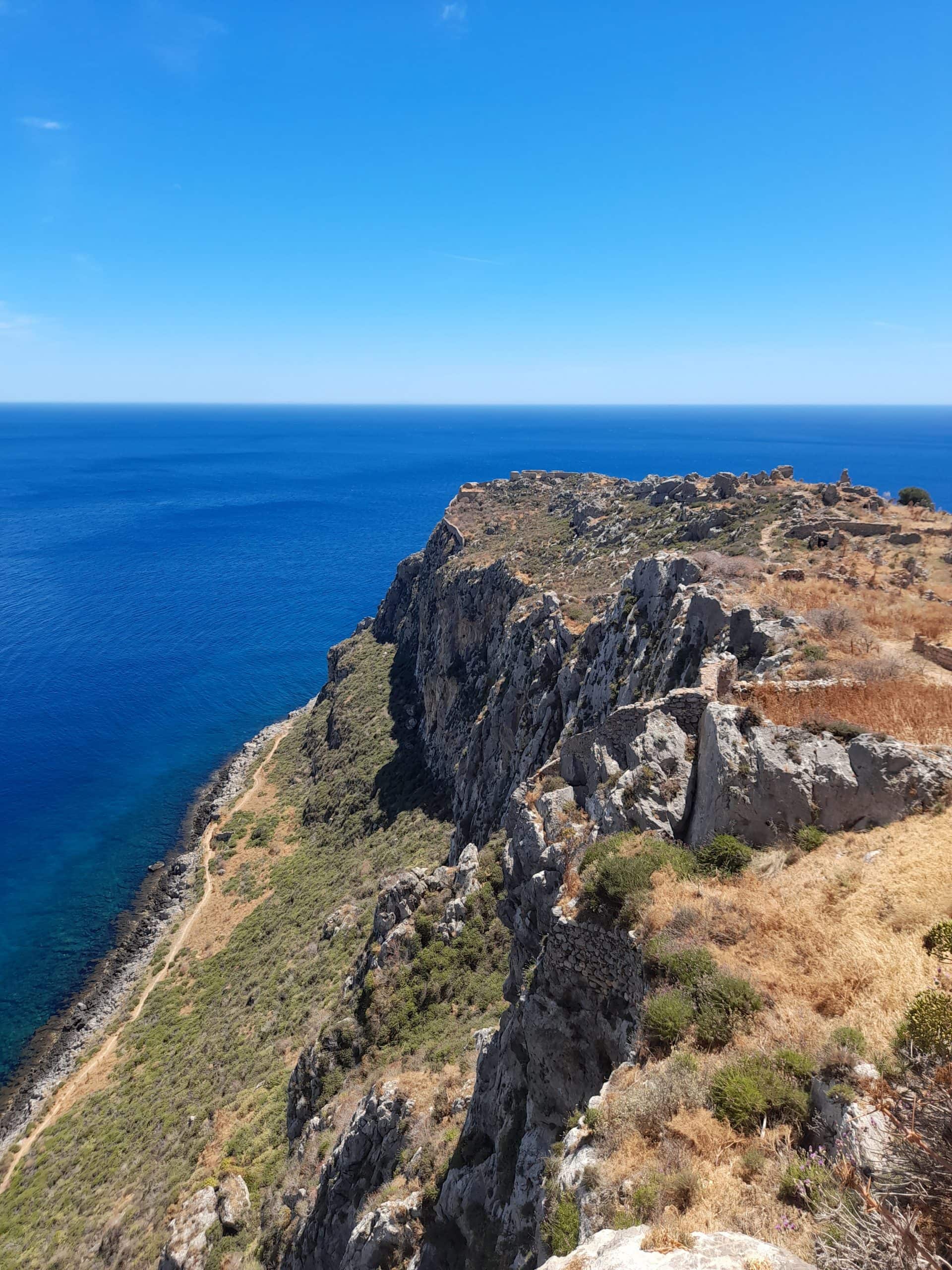
If you are planning on moving to Greece, the first step is to establish what visa options are available to you. Things are notably easier for EU citizens.
However, with the ever-increasing interest in working remotely in Greece, relocating is becoming easier for citizens of other countries too. If you are moving to Greece from an EU country, you can simply travel to Greece, and then register with the local authorities within 90 days of arrival with your supporting paperwork.
You just need to demonstrate that you either have a source of income and some saved funds to support yourself or that a Greek national will be ¨sponsoring¨ your stay. Even if you do not register with the authorities in a timely manner (i.e. within 90 days), you will be supported when you do.
If you are a third-country national (i.e. someone relocating from outside of the EU), you need to establish whether you are eligible to move to Greece on a spousal/familial visa, a Greek golden visa, or a financially independent person´s/Digital Nomad visa. This can be complicated and you may find that you need to hire an Immigration attorney to help you navigate the minefield of Greek bureaucracy.
Relocating to Greece as an EU citizen
Being able to move freely across borders and live in any EU member state makes relocating to Greece very easy for EU citizens. You can simply travel to the country, see if it is a place that you want to live long-term, and then register with the police.
Still, there are some criteria that you need to meet. If you are unemployed and seeking work, you must show that you have sufficient funds to support yourself in Greece.
This is typically around €4,000. Ideally, this should be in a Greek bank account, but proof of funds in other bank accounts may be accepted.
It varies from one part of the country to another and the mood of the specific people you deal with when applying for your permit. (Welcome to Greece!)
If you are unemployed or have been hired by a Greek company, you need to show proof of income. This can be via an employment contract or tax returns.
If a local relative or partner is going to be vouching for you in Greece, this is known as the hospitality route. Your nominated Greek ¨sponsor¨” will need to accompany you to the police station and fill in a selection of forms. If you opt for this route, you do not have to provide extensive proof of funds for you, the foreign applicant.
Different residency permits for EU citizens in Greece
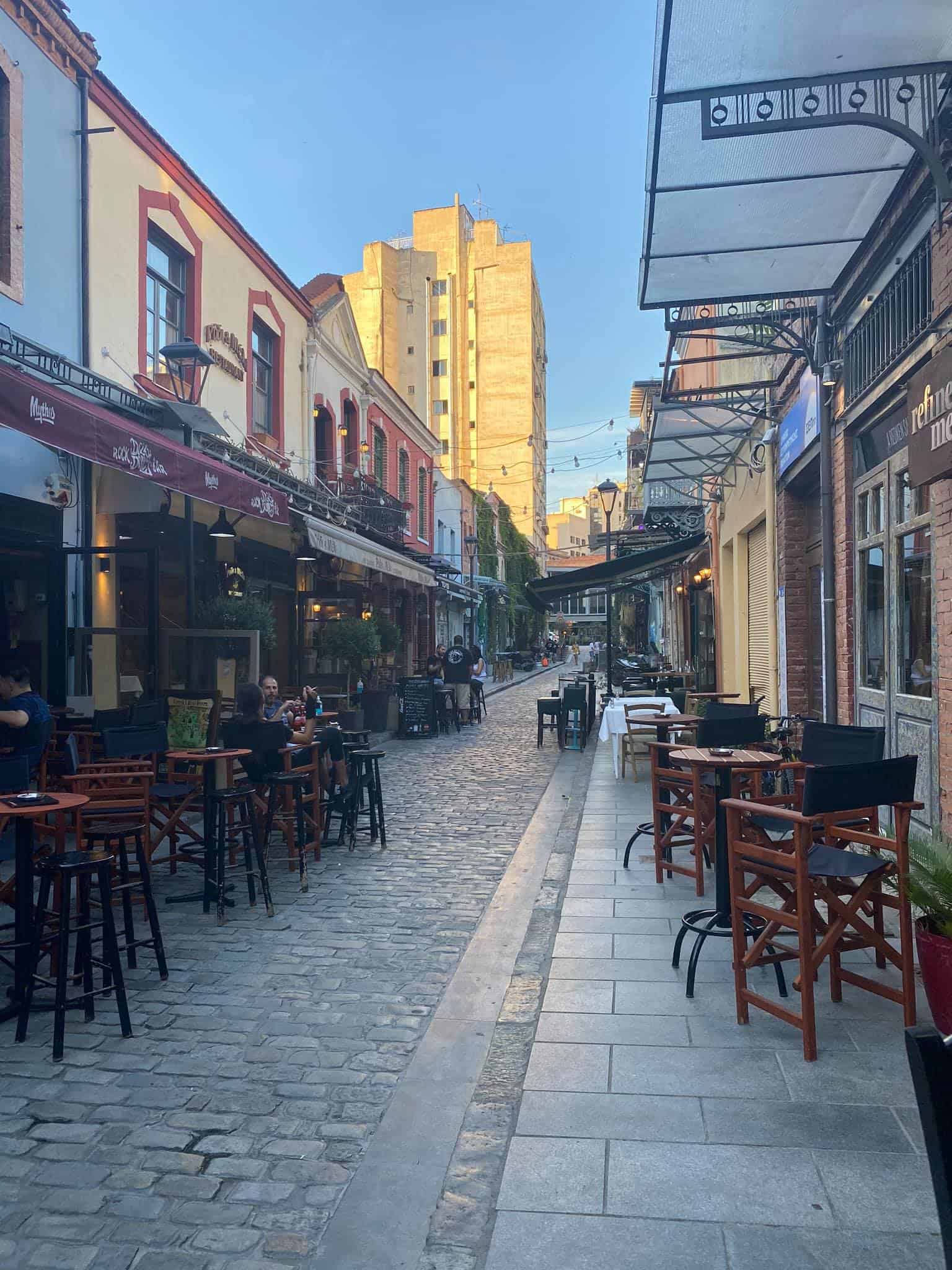
There are two different types of residency permits in Greece that can be obtained by EU citizens. Namely, the temporary residency permit, and the permanent residency permit.
You need to apply for the temporary permit in the first instance (“Άδεια παραμονής”). Prior to Greece making everything digital and introducing biometric permits, this was a beige piece of paper. So if you hear people referring to ¨the beige permit¨, this is what they mean.
Your temporary permit is valid for 5 years. After that time, you can apply for permanent residency in Greece.
A permanent residency permit is easy to obtain. You do not need to provide all of your supporting documentation again. Instead, you simply make a new appointment with the authorities and request to exchange permits.
There have been a few instances where EU residents have tried to trade their temporary residency permits for permanent residency permits and were told that this was not necessary. Again, unfortunately, this is the problem with bureaucracy in Greece!
You should insist. It is important to have the correct documentation. If you want, you can then go on to apply for Greek citizenship after 7 years.
Paperwork and residency requirements for EU citizens moving to Greece
There are a few different documents that you need to take with you when organizing your appointment for your Greek residency permit. These are detailed below.
- 2 x Passport-sized photos
- A photocopy of the passport
- Medical insurance certificates
- Clear health check (no contagious diseases, etc)
- Proof of address in Greece
- Proof of employment (a signed contract is sufficient) OR proof of sufficient funds if unemployed/self-employed (4000 euros)
Receipt of Residency Application
Once you apply for your Greek residency permit, you will be provided with a little note that states that your application is being processed. It can take anything from a month to several months for you to receive the permit back again.
During that time, you can remain in Greece and exit and re-enter the country as you like. Just be sure to carry the blue slip with you to show that you are residing in the country.
British citizens living in Greece on residency permits since before Brexit

Since the 1st of January 2021, British citizens have been classed as ¨ third-country nationals¨. This is following the UK’s exit from the EU.
Since that date, British people are no longer eligible to enter Greece and apply for a residency permit on arrival as EU citizens. If you have been living in Greece since before Brexit, you ought to have switched your old beige/blue residency permit over to a biometric permit.
The deadline for this was June 2021. If you never registered correctly with the Greek authorities prior to Brexit but you have been living in Greece long term, you can apply for a residence permit with supporting documents.
These documents should prove that you have been living in Greece since prior to Brexit. If you are British and hope to move to Greece from the UK or elsewhere now, you need to look at other options.
Greek Digital Nomad Visa
The Greek Digital Nomad visa is a new initiative introduced in Greece in the summer of 2021 through Law 4825/2021. It means that non-EU citizens can legally live and work in Greece, provided that they have a source of income from outside of Greece and that they meet certain requirements.
If approved, the visa is valid for one year and can be renewed upon expiry. You ought to contact your local Greek embassy/consulate in your home country to start the application process.
The Greek Digital Nomad visa is classed as a type D visa. Your application, a fee of €75, and your supporting documents should be submitted to the embassy.
If you are applying independently, you need to be able to demonstrate that you have a minimum monthly income of €3,500 a month. If you have dependents moving to Greece with you, that changes accordingly.
You need to demonstrate earning an additional 20% of the €3,500 salary requirement for a dependent spouse, and an additional 15% per child. You local Greek embassy should be able to assist you with any questions on this.
Since you are classified as a tax resident of Greece if you spend more than 183 days of the year in the country, you may be expected to pay Greek taxes on this visa. Do clarify with a Greek accountant or tax specialist who can advise you on your specific circumstance.
Financially Independent Person Visa
The Financially Independent Person visa for Greece (FIP) is in some ways comparable to the Greek Digital Nomad Visa. You need to demonstrate that you have a monthly salary from outside Greece of at least €2,000 a month, as well as a certain amount of money in savings.
The amount of savings that you need to be able to demonstrate may vary from one country and one embassy to another. However, you should expect to have to show proof of around €40,000-€45,000 in savings.
To obtain the FIP visa, you need to apply for a type D entry visa prior to traveling to Greece. You may find it easier to hire an Immigration Lawyer to assist you with the process of applying for this, particularly if you are relocating as a family.
Golden Visa Greece
The Greek Golden Visa aims to encourage investors to purchase property or stocks in Greek businesses. In exchange for their investments, they are automatically given Greek residency for five years.
To be eligible, you need to purchase property valued at at least €250,000. This can be split across multiple properties.
It is also worth noting that if you already have a property in Greece (a holiday home or otherwise), you can use the value of that existing property towards the €250,000. The residency visa can be renewed every 5 years, provided that you do not redact your investment.
If you are married and/or have children that are up to the age of 21, your entire family is covered under this program. You can also obtain a golden visa by investing values of between €250,000 and €800,000 in various different government bonds, real estate bonds, venture funds, etc. Since this becomes relatively complicated, you really ought to hire an Immigration Lawyer to assist you with the process.
Spousal visa/Greek heritage visa for Greece
If you are married to a Greek citizen, you are automatically eligible for residency. Greece also offers a civil union option for same-sex couples.
You may be required to provide various documents to prove your relationship, including marriage certificates. If you are of Greek heritage, you can apply for Greek citizenship by descent.
Greece recognizes third-generation citizens as being eligible for citizenship by descent. This means that if your grandparents or great-grandparents relocated from Greece, you are eligible to relocate to the country if you can prove your familial ties.
Decide where you want to live in Greece

Establishing where you want to live in Greece is a crucial stage of relocating. Living on Greek islands is much different from life in Greek cities. You should absolutely plan a trip to Greece ahead of making the move.
That way, you can get a feel for what the country and culture are like. Spend a few weeks adventuring around the country, or a couple of days exploring the cities that interest you.
If your schedule and work commitments allow it, it is a good idea to spend several months having a trial run of living in the country. Living somewhere permanently is very different from being there on vacation.
For instance, if you dream of living in Athens, spend a couple of weeks at a short-term rental in one district, and a couple of weeks in another. That way you can determine which Athenian neighbourhoods you prefer.
Moving to Athens

Athens is great. Despite being a huge capital city, it doesn’t have that overwhelming big-city vibe. The Greek capital is made up of lots of cute districts, each with its own unique personality.
Syntagma Square, Monastiraki, and Ermou street are what most people classify as the ¨centre¨ of Athens. People will often exclaim that Athens is not all that beautiful. However, the reality is, that Athens goes way beyond its chaotic downtown and when you live in Greece, you get to discover the various quirky parts of the city.
For instance, charming Koukaki could be likened to the Greenwich Village of Athens. Its leafy streets are filled with quirky coffee shops, vintage clothing stores, and independent art galleries.
Upscale Kolonaki is the Beverly Hills of Athens, known for its chic international eateries, cocktail bars managed by award-winning mixologists, and designer stores. Each Athenian district has its own central plaza with everything that you could possibly need, meaning that you never really have to venture to the city centre.
The stunning coastlines and cerulean waters of the Athenian Riviera are just a thirty-minute drive away too. If you choose to base yourself in the coastal towns of Voula, Vari, Vouliagmeni, or Glyfada, you can enjoy the peace and serenity of life by the sea, yet still, be close enough to the city centre for any trips you need to make to town.
Live on a Greek island

If the idea of living a laid-back life on a Greek island is something that appeals to you, you have a plethora of options available. Greece is home to more than 6,000 islands! Here, you can live in an adorable little house in the Cyclades and live out your own “Eat Pray Love” style story.
Do as much research and reading about the place that you want to move to before you go. If you are able to, visit Greece in Autumn or the winter so that you can see what life on the island is really like.
Some Greek islands become overrun with tourists during the summer months. Then, during the winter, many become ghost towns.
Obviously, people live on most islands all year round. However, from October onward, you will find that a lot of businesses close their doors until the following May.
You will find that a lot of Greeks and expats only live on some islands in the spring and summer months and then they head back to the mainland or to other countries for the winter. This can be great if you like nature and peace and quiet, but it can be isolating if a social scene is important to you.
Boats run between the islands and the mainland all year round. However, the schedule is more limited in winter.
It is a good idea to make a list of all the important qualities that you are seeking from the place you are hoping to move to. Is an ex-pat community important to you?
Are you moving to Greece with your children? If so, are there good schools in the area?
Are you working remotely? If so, have you researched whether the internet connection is good and if the island has regular blackouts?
Greek islands like Corfu and Rhodes have large ex-pat and retiree populations. Smaller islands like Kea, and Anafi have fewer foreign residents but may suit you down to a tee if you prefer a quintessentially Greek island vibe.
Research the Best Neighbourhoods in Your Chosen City
Once you have chosen where you want to live in Greece, start researching the various districts and neighbourhoods in your chosen town/city. The area that you stay in can really make or break your experience of living abroad.
In Athens for example, I live in Pagrati in the south of the city centre. It’s a quirky district with lots of antique shops and eccentric coffee places so I fell lucky. Unfortunately, though, it has become quite a sought-after district and that is driving up rental prices.
You will find many newly renovated apartments in Exarchia and Patissia and the prices can be super affordable. However, both of these areas have less-than-ideal reputations and crime rates so they are not for everyone.
I’m just using Athens as an example here, but whichever city or region of Greece you wind up choosing, be sure to do your research. Join local Facebook groups and forums for ex-pats in your city if you want insider advice.
Understand the Cost of Living in Greece
One major advantage of moving to Greece is the lower cost of living that the country offers. This is becoming particularly appealing as inflation and a cost of living crisis are starting to affect many other European countries in 2022.
In fact, a recent study by Eurostat, the European statistics office, indicated that Greece is the only country in Europe where property prices remain at their 2010 levels. The cost of living in Athens, which is arguably the priciest place to live in the country, is still 30% cheaper than living in other European cities
Costs are rising year on year, particularly with the influx of foreign residents and investors purchasing property and pushing up rental prices. However, the costs are still substantially lower than elsewhere.
When planning your move to Greece, is a good idea to research the cost of rent, health insurance, transport, etc, in the part of Greece that you are hoping to live in. That way, you can draw up an estimated monthly budget.
A single person could easily live comfortably in Greece for €1000 a month. You can have the same comforts that you would in the UK, the US, or elsewhere, for a fraction of the costs. The additional advantage is that if you do earn a decent amount of money, you will find that you are able to save money effortlessly here.
Rental costs in Greece
Rental and property costs vary significantly in Greece depending on the city/area/region that you are planning to live in, the specific neighbourhood, and the size/spec of the property. In Athens, you can find a one-bedroom apartment for between €350-€400 a month.
You should expect to pay between €500-€600 for a two-bedroom apartment. In Thessaloniki (particularly in the outer suburbs), Ioannina, Patras, Volos, and other Greek cities outside the capital, you may find even more affordable accommodation options.
If you are interested in living on a Greek island, keep in mind that the cost of living varies a lot depending on the specific island you are considering. So too, does the availability of rental accommodations.
For instance, tourist-favorites Mykonos and Santorini are among the most expensive islands to relocate to. Skiathos town in the Sporades is so popular with tourists that it is very hard to find long-term rental long accommodation. (Most locals prefer to maximize what they can make by charging premiums to tourists in the summer, even if it means the property goes unoccupied in the winter).
Spiogatos and XE.gr are the two main property websites. You may also find listings in Facebook groups but be cautious about exchanging money in this way.
Greek ex-pat Facebook groups can be a great source of information and advice. There are dozens of general Greece expat groups, as well as groups that are specific to expats living on a certain island or in a particular region.
These groups are a good place to check what you have been quoted for an apartment rental (or anything else in Greece). It is not unheard of for people to try and trick foreigners by quoting them an inflated price. Always sense-check any quotes you receive with your local friends or other expats.
Finding Work in Greece
The absence of large international companies means that it is difficult for educated ex-pats to find work in Greece. It will be difficult to secure a job here unless you are fluent in Greek.
That said, there are occasional opportunities for English speakers to work in the offices of large multinational companies. Alternatively, you may find work in the travel industry as a tour guide, hotel receptionist, etc. In the more affluent areas of Athens and other large cities, there is a demand for English teachers.
If you are hoping to move to a Greek island, keep in mind that a lot of the work in the hospitality sector is very seasonal. The tourism season in Greece runs between May and September.
Manage your salary expectations
The average salary in Greece is around 600 euros per month. English Teachers and professionals can expect to earn around 1000 euros per month. This is considered a respectable middle-class salary in Greece.
Although the pay is much lower here as compared to other European countries, so too is the cost of living. It’s all relative.
Be realistic about what is possible
Be realistic when it comes to moving to Greece and finding work. A lot of people fall in love with the idea of moving here and do not fully educate themselves on the situation in Greece.
That is not to say that you should not make the move. However, you should make a plan and be aware of the country’s economic situation.
The economy in Greece has still not recovered fully. There are countless educated Greek people in Athens who have degrees and are fluent in numerous languages yet struggle to find work. As a foreigner and especially a foreigner who cannot speak Greek, the quest to find a job here becomes that extra bit more difficult.
Work online if you can
The struggle to find work in Greece can be omitted if you are able to work remotely or online. You may be surprised by how many companies and employers are open to the possibility of an employee working remotely.
You will find many job postings listed in Digital Nomad/Remote Working job boards and Facebook groups. Everything from Administrative assistant roles to global Project Manager positions can be found.
Practically any office job that you would do at a computer can be done online. Platforms such as Upwork and Freelancer are free to sign up for and contain a plethora of job listings in various different fields. You may also find the occasional opportunity on Linkedin.
Establish whether you need to pay taxes
Establishing whether you need to pay taxes or not is a crucial consideration of moving to Greece. Ultimately, navigating the world of Greek taxes is complicated.
If you are employed by a Greek business, your company will manage your taxes for you. However, if you are self-employed, you need to consult a local accountant and tax specialist.
Whether or not you are required to pay taxes in Greece depends on several factors. Namely, the type of visa you are living in the country on, the amount of time you spend in the country, and whether your income comes from Greek sources.
Paying taxes in Greece may be a prerequisite for certain Type D visas. Greece has a double taxation agreement with several countries (including the UK).
This protects you from having to pay taxes in two different countries. If you spend more than 183 days a year in Greece, technically Greece should be your ¨domicile¨ (aka where you pay taxes).
Paying taxes as a business owner in Greece
Taxes for business owners and freelancers in Greece are very high and there are few tax breaks. Taxes also need to be paid in advance.
You may find that as a business owner, your taxes become more expensive in Greece compared to in your own country. Tax MUST be paid in Greece if you are self-employed and you make money through Greek sources. If you make money online from other countries (the USA, the UK, etc), things get tricky.
You will generally be much better off if you can pay your taxes to your home country. If you divide your time between Greece and elsewhere, you can declare the other country your domicile if you spend more than 183 days there and the rest of the time in Greece.
Still, this is complicated and as advised, you need to consult a specialist. Taxes need to be paid in advance and fines are strict for any errors in reporting.
If you overestimate how much you are likely to make for the year and subsequently overpay on your taxes, you don’t get your money back. Conversely, if you have a better business year than you predicted, you will encounter vicious fines.
Build professional contacts before you leave
Before you take the leap and dive into the unknown, try to be as prepared as physically possible. If you have not secured work and hope to do so on arrival, reach out to various people in advance.
For example, if you hope to teach English in Greece, send an introductory email to the British embassy, and several language academies. Try to see if they plan on hiring in the foreseeable future.
Ensure that they have your resume on file. Join groups on Facebook such as “Expats in Athens” to see if anyone is looking for an Au Pair or an English-speaking nanny.
If you are looking for a more corporate-style role, the same logic applies. If you are planning on moving to Greece with the intention of freelancing or becoming a Digital Nomad, try and build up contacts, clients, and experience as a side hustle before leaving your full-time job. This minimises stress and pressure.
Find a house or an apartment in Greece

To find apartment rentals in Greece, you can browse the properties on xe.gr or Spitogatos. You can also join Greece Facebook groups like Expats in Crete, Expats in Athens, etc, as people also often list properties there.
It is important to note that going through a letting agent via the above sites when moving to Greece means having to pay additional fees and a deposit. Landlord fees and deposits can be relatively high, and you may have to pay the equivalent of a month’s rent for each.
It is possible to rent property directly with landlords, though you should triple-check the price and obtain several quotes. It’s not uncommon for foreign ex-pats to be quoted falsely higher prices.
Ask a Greek friend to double-check the prices that you have been quoted. Alternatively, ask for a second opinion in the aforementioned Facebook groups.
Finding temporary accommodation
It may be the case that you have to move from your home country to some form of temporary accommodation in Greece while you search for a longer-term rental or some property/land to purchase. Airbnb may be the short-term solution that springs to mind.
However, some of the listing prices there are extremely extortionate versus the actual costs of renting an apartment in Greece. Again, check the Facebook ex-pat groups where people often list short-term rentals. You may find that someone is out of town for the summer and is willing to rent their home to you while they are away.
Obtaining a Greek Rental Contract
You should ensure that you get a rental contract for your apartment/house in Greece if you are renting. This may be required as proof of residency when you apply for your residence permit (if applicable).
If your landlord refuses to provide you with a rental contract, there is a good chance they are not declaring their income. The contract should be provided in Greece via an online platform called Taxisnet.
Other things to do when moving to Greece
Have you established what visa you qualify for, where you want to live and what you are going to do work-wise in Greece? Great! Now let’s look at the various admin tasks you need to do locally to complete your move.
Get a Greek SIM card

To stay connected in Greece, you should buy a SIM card for your phone. This can then be used all over Europe.
There are a number of providers here – some Greek, some international. The main phone companies in Greece are Vodafone, Cosmote, and Wind.
Cosmote is the most popular provider in Greece. They offer better 4G coverage than their competitors.
The rates between the different providers are comparable. You can buy a prepaid SIM with a data/call/text bundle just as you would anywhere else. Expect to pay around €10-15 for 5GB of data, unlimited SMS messages, and several hundred minutes.
If you don’t want that, you can also buy an old-fashioned “pay as you go” SIM. Top-up vouchers can be purchased at supermarkets, convenience stores, tobacco kiosks, and online via the app.
Getting a SIM card in Greece is pretty straightforward. Just head into one of the local phone stores with your passport.
You can also pick up a SIM card at Athens airport. There is a phone section within the “Public” store.
Apply for an EHIC card (EU Citizens)
If you are an EU citizen, you should already have an EHIC card. If you don’t, then make sure that you do so before moving to Greece!
An EHIC card (European Health Insurance Card) allows you access to state healthcare in 28 countries across the EU. This is NOT a substitute for health insurance in Greece. However, it is something that you should have when you first arrive.
Purchase comprehensive health insurance
Private health insurance is a prerequisite for obtaining several different visas for Greece. Fortunately, this is generally quite affordable and several reputable global insurance companies operate in Greece (e.g. Allianz, AXA, and Cigna Global).
Your insurance may be paid monthly or annually depending on your specific plan. Keep in mind that your costs will vary depending on your age, health, and various lifestyle factors (e.g. whether you smoke, etc). A healthy middle-aged adult can expect to pay around €40-50 a month.
Even if private health insurance is not a requirement for the type of visa that you are relocating on, it may be something that you want to consider. Hospitals and medical care in Greece are among the worst in Europe. If you visit a doctor in Greece without insurance, expect to pay around €50 for a consultation.
Get an AFM Number
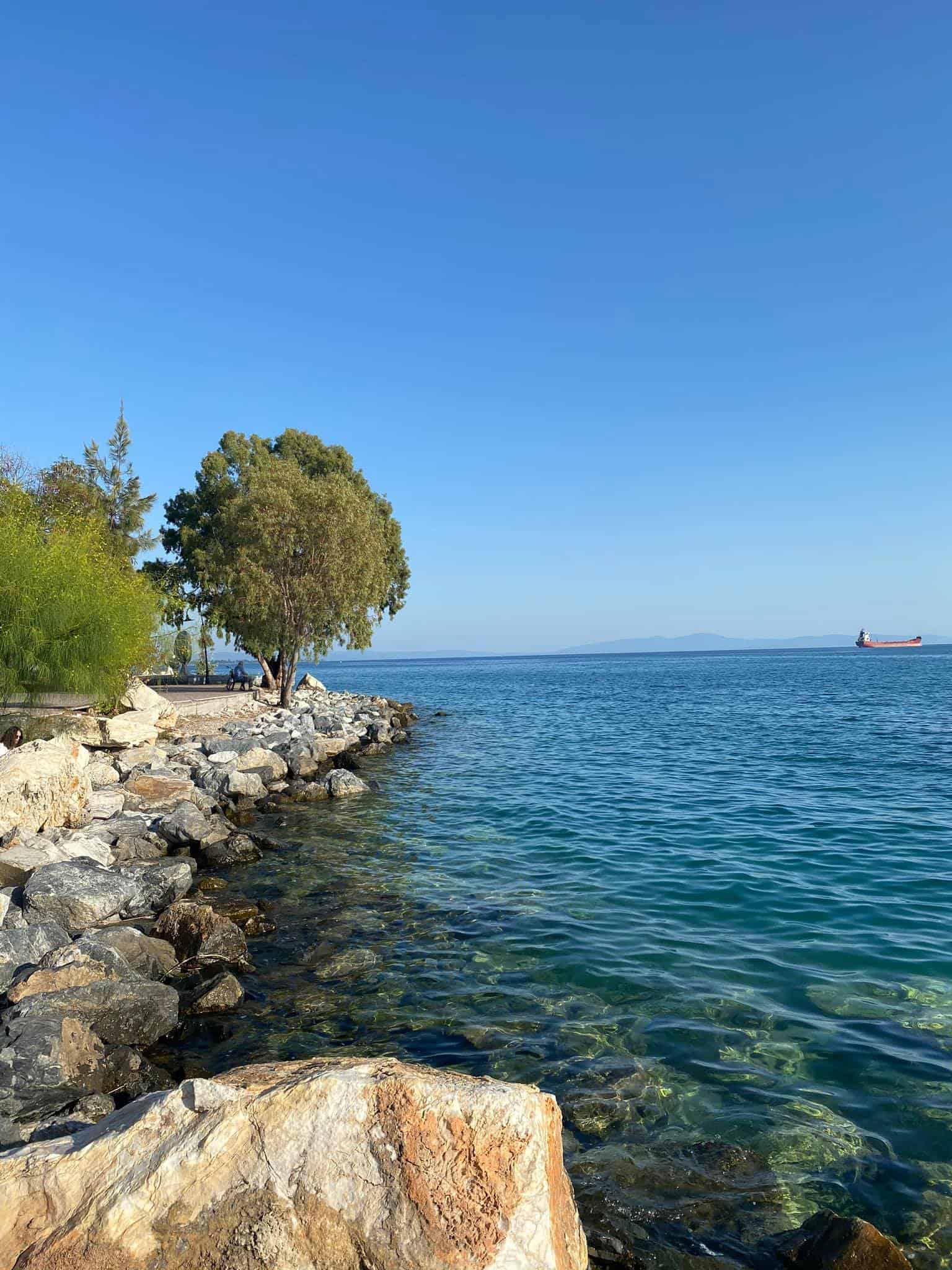
Applying for an AFM number should be one of the first things you do when you arrive in Greece. AFM (Arithmo Forologiko Mitro) is your tax number.
You need this in order to work in Greece and to open up a Greek bank account. You can search for the nearest tax office to you here.
Then, you need to make an appointment and visit the tax office in person with any requested documents. (Typically, your passport as proof of identity, your visa documents, etc).
You do not have to wait long for your AFM number. This is usually issued immediately after your Eforia appointment.
Get an AMKA number

Confusingly, there are two different numbers that most people who move to Greece need to apply for: An AFM number and an AMKA number.
An AFM number is used for tax purposes. Meanwhile, the AMKA number is the Greek answer to the social security number.
Anyone employed by a Greek company or claiming Greek benefits needs to have an AMKA number. EVERYONE needs to have an AFM number.
You don’t need an AMKA if you are retired and receiving your pension from another country besides Greece. Nor do you need it if you are self-employed and your income comes from outside of Greece.
Your Greek employer may register you for an AMKA on your behalf. You can use this site to check if you are in the AMKA database.
Sadly, this is not a foolproof way of checking things. It may well be the case that your employer has registered you and you do indeed have an AMKA number and yet your info doesn’t come up. Welcome to Greece!
You can also register for your own AMKA number by heading to your local KEP/AMKA office. You can find your local KEP office here.
Open a Greek bank account

When you move to Greece, you will need to open up a Greek bank account. If you are hired by a Greek employer, your salary will be paid into a Greek account.
Even if you are self-employed, it is best to have a Greek bank account. You may be asked for information about this as part of your application for residency status. However, some police stations are happy for the proof of funds to be displayed in a foreign account in your name.
To open a Greek bank account, you must go to the bank in person with your passport and AFM. Each bank will also have a checklist of supporting documents that you need to take with you. These vary depending on the specific bank.
You can find both International and Greek national banks here. The main Greek banks are detailed below.
- Piraeus Bank
- Alpha Bank
- National Bank of Greece
- Eurobank
Check the small print before you commit to an account. Many Greek banks charge pointless admin fees or high fees for international transfers and third-party ATM withdrawals.
The National Bank of Greece is arguably the best option. You may also want to consider opening a borderless bank account such as those offered by Wise, Revolut, or Charles Schwab. These accounts do not charge you for international transactions and they are a great way of moving funds between your Greek bank account and the bank account in your home country.
Tie up loose ends back at home

Ready to move to Greece? There are probably lots of loose ends to tie up back at home too!
- Sell your home or find a tenant
- Put your things in storage, sell them, or decide how to ship them to Greece
- Cancel any unnecessary memberships from home – gym memberships, fitness classes, cinema passes, etc
- Cancel your phone contract and ensure that your phone is unlocked
- Read up on tax requirements – Some countries require that their citizens still pay taxes, even if they move overseas. Americans for example, still need to pay taxes. British people may still have to pay NI
- Sell your car or put it into storage
- Notify your bank that you are moving overseas
- If you don’t need to pay taxes to your home country while abroad, you may need to notify your government.
- Reroute your mail
- Notify your student loan company (if applicable)
- Dance around your living room to Zorbas music while packing and preparing to move to Greece!
Set up wifi
If you move into your new Greek apartment and wifi isn’t already set up then you need ample servings of one thing: patience!
Forthnet is the main internet provider in Greece. Wind is another popular choice. Other ISPs in Greece worth noting are detailed below.
- Net One
- Otenet
- Hellas On-Line
- On Telecoms
- Tellas
- Vodafone
Fiber broadband is available in some parts of Greece. Internet signals can be weaker on some of the islands compared to Athens.
Internet prices in Greece are comparable to what you would expect to pay elsewhere in Europe. As an example, Forthnet plans start at €25 per month.
Getting anything done in Greece is often slow. Setting up wifi is no different.
You may have to wait 3-4 months for your home wifi to be set up. Ensure that you have a comprehensive phone data plan or portable router in the meantime.
In addition to your monthly wifi cost, keep in mind that you may also have to pay some initial upfront costs for the setup. E.g. you may be charged for the router or you may be charged an installation fee.
Get a Greek driving license
Depending on where you are moving from, you may or may not need to get yourself a Greek Driving License. If you already have a valid Driver’s License issued by an EU/EEA state, you can use your current license without restriction.
Third-country nationals (including British citizens) need to switch to a Greek driving license.
Switch bills into your name
Electricity, water, building maintenance, and internet are the main bills that you will have to manage when you move to Greece. If you are renting an apartment, it is not uncommon for the landlord to keep the first three in their name. If this is the case with your Greek home, make sure to take a meter reading for the electricity when you arrive.
Electricity
You will need to go to your local electricity board office (DEH/DEI) if you purchase your own home in Greece. This is also the case if you are renting a property and the owner requests that you put the bills into your name,
You will need your tax number and passport, along with some additional supporting documents. If you are setting up a connection for the first time, rather than changing the name, you will still need to go to the DEH office.
In a one-bedroom flat, you can expect to pay around €70 a month for electricity. This is based on two people sharing and reasonable consumption of air conditioning.
Water
To set up your water bills in your name, you need to go to the local water board office with your meter number and ID. The board will generally charge a small admin fee for this.
Water bills are usually paid three times a year. Prices vary depending on your consumption but assuming that you are a couple cohabiting in an apartment, you can expect to pay around €20 a month.
Building maintenance
Many apartment buildings across Greece require their tenants to pay a building maintenance fee which may be payable monthly or quarterly. This can be anywhere between €30 and €60 a month.
You will be informed about the specific amount of your building maintenance fee when you sign your lease. This includes things such as weekly cleanings of communal areas, repair work, etc.
Buying property in Greece
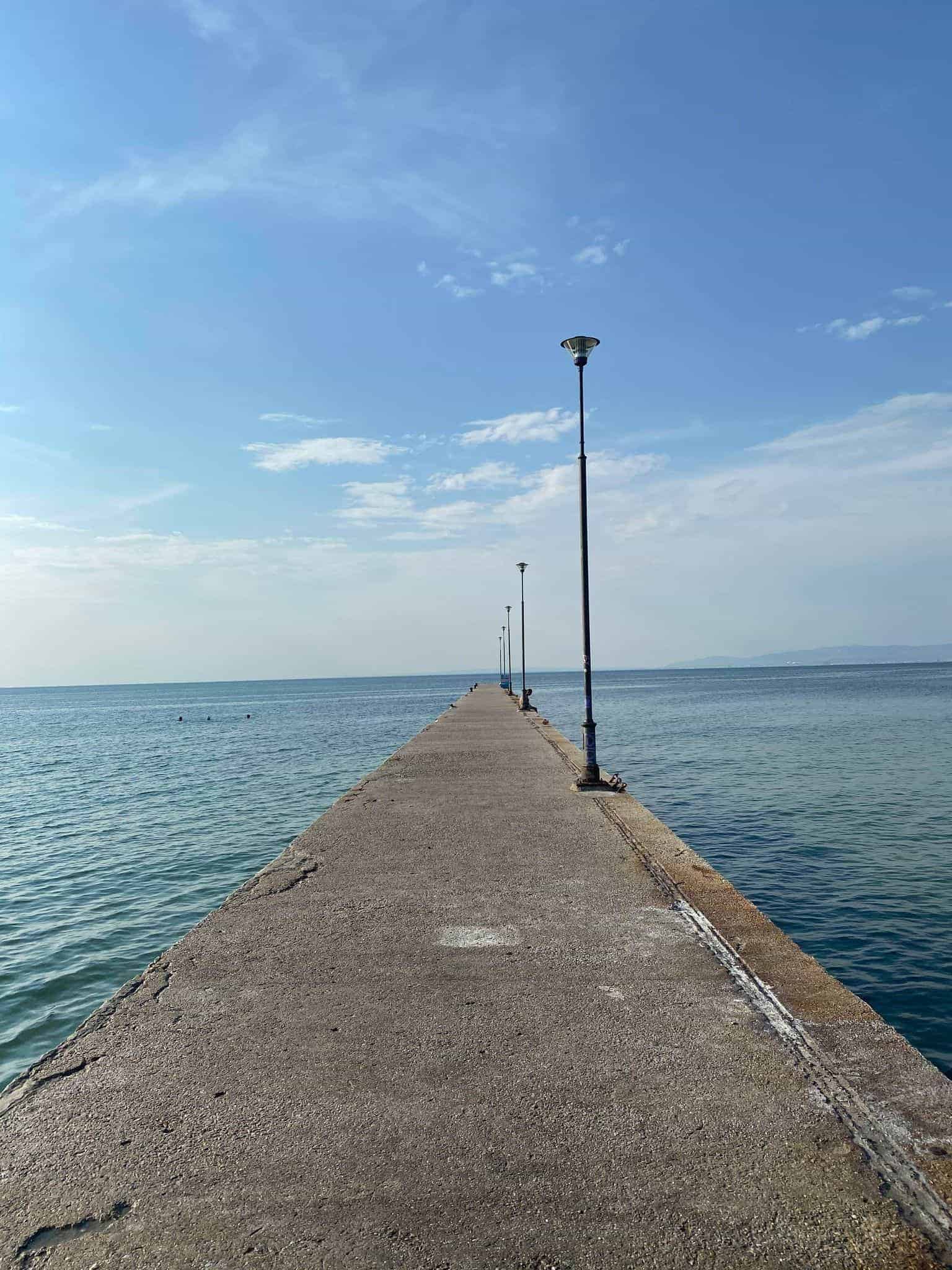
If you are an EU citizen, you can easily buy property in Greece with no restrictions. People of other nationalities can buy properties in Greece but there are some restrictions in place.
For-sale properties in Greece are listed on the same sites as rental options. For instance, Spitogatos, or XE.
Before you think about buying a house here, you need to ensure that you have a Greek bank account and tax number set up. Admin costs can add up when you purchase a property in Greece – just like anywhere else really. Your first step should be to hire a Real Estate Attorney.
Buy furnishings for your new place

There are lots of excellent stores for buying furniture in Greece in order to decorate your new place. This is especially the case in big cities like Athens and Thessaloniki which are home to several inspiring boutique interior design stores.
Some lovely independent interior shops to consider are Paraphernalia, DesignShop, Box Architects, Myran, El Greco Gallery, and Roma 5 Design. Many of these places also offer delivery across the country.
Of course, IKEA branches can be found throughout Greece. This is a good, low-cost place to buy your basics.
Food shopping in Greece

On the whole, food costs are cheaper in Greece. With a plethora of high-quality, locally sourced fruit, vegetables, and meats available, it’s easy to eat healthy in Greece without having a sky-high food budget.
It’s advisable to shop at your local laiki agora for fresh produce rather than the supermarket since products are often fresher and cheaper. These are neighbourhood farmer’s markets.
Laiki are held once a week in each district. You can check with your new neighbours to see where yours will be and when.
Branded products like cereal, condiments, and snacks/chocolates are sometimes quite a bit more expensive in Greece due to the import taxes. If you live in Rhodes though, there are no import taxes and so that’s a nice little extra perk to living on a beautiful Greek island.
Building your social circle in Greece

It’s important to build a social circle when moving abroad to make your new place feel like a home away from home. The ease of meeting people depends a lot on where you choose to live.
Some islands, like Corfu or Skopelos, are home to large ex-pat groups. It is easy to meet people here as you just get to know people as you spend more time on the island. Things are trickier on remote islands with small populations.
Athens and Thessaloniki have an ever-expanding community of remote workers and international ex-pats. Some resources to consider are detailed below.
- Couchsurfing – Through the events, forums, and hangouts, it’s possible to meet locals, fellow expats, and travellers for a coffee or a walk.
- Meetup.com – Meetup hosts regular events for people of different interests. For example, foodies, wine lovers, writers, etc. If there is not something that tickles your fancy, you can also create your own group.
- InterNations – An expat group for professionals. InterNations organises frequent events in Athens and beyond. Generally attracts an older crowd
- Facebook Groups – There are numerous Facebook groups and forums dedicated to moving to Greece and meeting others in the same boat. I manage a group called “All Greek to Me” which is a community for people travelling in or moving to Greece to exchange travel tips and advice.
Additional things to know when moving to Greece
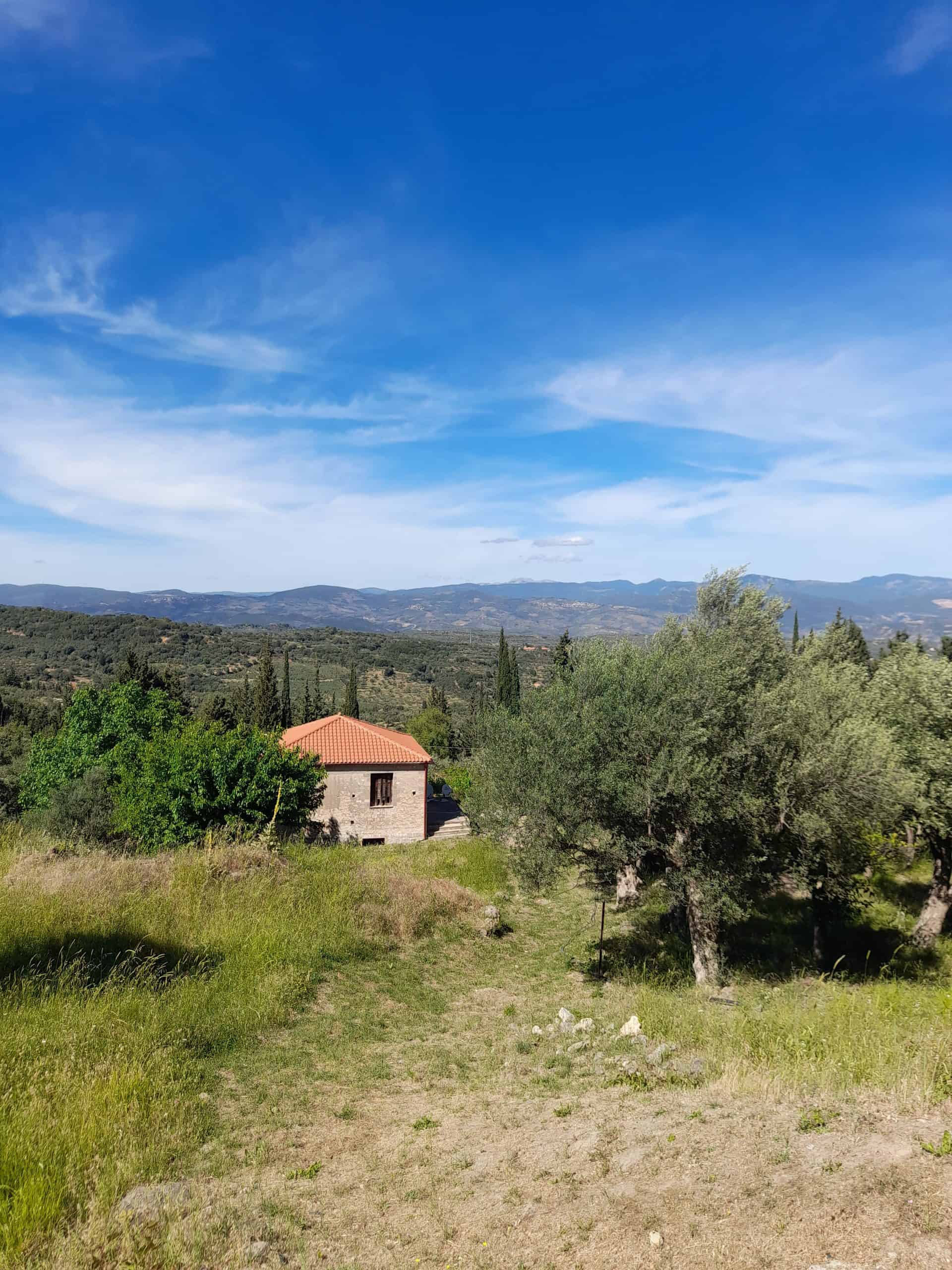
A few random extra things that might be useful to know about moving to Greece are detailed below.
Bureaucracy is a major issue
A lot of people think of Greece as being the Wild West. The country has developed a bit of a reputation for being a difficult place to get things done. This is especially the case regarding bureaucratic stuff and paperwork.
If there is one major thing that is holding the Greek economy back, it is bureaucracy. Doing the most simple thing here involves an outrageous amount of red tape.
You need to have the patience of a saint to put up with this. Sometimes it can be infuriating when you are being referred here, there, and everywhere by the authorities.
Processes are often illogical. You may want to consider hiring a lawyer to help you when it comes to complex matters like immigration or property purchases. It will help preserve your sanity!
It’s all Greek to me!
Most Greek people have a good understanding of English. This is especially the case in major cities and islands that attract tourists. That said, having a basic grasp of Greek goes a long way.
Having a handful of phrases up your sleeve like “kalispera” (good evening!), “kalimera”, (good morning), etc. is useful in the first instance. If you live in a remote area, you will find it limiting and isolating if you cannot communicate with those around you.
If you plan on living here in the long term, you should really make some effort to learn the language. You can find a lot of schools offering courses in the bigger cities. You can also hire tutors for one-on-one learning.
Water in Greece is potable
You can drink water in most of Greece. The water on the mainland is fine, and the water in Athens is clean and delicious. You will not get sick from drinking it.
That said, it’s a personal preference. A lot of people prefer to drink bottled or filtered water.
It is best to avoid tap water in certain small and remote islands like Skiathos or Skopelos. Although it isn’t toxic, it contains a high amount of sediment.
Plumbing can be old-fashioned
Sewerage systems in Greece are underdeveloped. You cannot flush paper down the toilets in most of Greece.
This is especially the case on remote islands. Some modern Athenian apartment buildings have been built with modern plumbing and waste management but not all of them. Better you know now than after an incident, eh?
Explore Greece
Cultural clashes, administrative paperwork, and headaches aside moving to Greece is a wonderful, life-changing experience. The beauty of living in a foreign country is having the opportunity to do completely different things and explore your new homeland during your weekends and free time.
Greece is home to over 6000 islands. However, only 227 of these are actually inhabited.
That means more island exploration, beautiful beaches, and scenic whitewashed tavernas than you could enjoy in a lifetime! Athens and the Greek mainland are also just as charming. For a little initial food for thought and Greek travel inspiration, take a look at this three-day Athens itinerary, or this guide to island hopping in Greece.
Opening hours differ in Greece
Working hours in Greece differ from those of other European countries. The opening hours of shops and businesses vary from place to place. However, generally everywhere is open from 9 am until 9 p.m.
Most small, independent stores close from 2.30 pm – 5.30 pm each day for a siesta. This doesn’t apply to large international chain stores in the cities.
The majority of businesses are closed on Sundays. Athens is still very much vibrant and alive during siesta hours. Meanwhile, small islands like Alonissos become practically ghost towns at this time.
Quiet, please
Residential areas in Greece enforce “quiet hours”. This is comparable to the Mediterranean siesta.
Quiet hours take place between 3 pm and 5 pm in the daytime, and from 10 pm to 7 am in the evenings. If you blast out your TV or music at this time, you can expect a disgruntled knock on the door from your neighbour!
A Cash-Based Society
When it comes to money in Greece, cash is still King. Larger shops and hotels usually accept credit and debit cards.
However, many smaller tavernas, coffee shops, and stores do not. It’s always prudent to carry a small amount of cash around with you.
Taxes on purchases
You will often find that when you go shopping in independent stores, go to restaurants, or even visit doctors and dentists, you will be offered a lower price if you pay in cash. This is so the person doesn’t have to pay taxes.
You should always ensure that you receive a receipt for your purchases in Greece. A common “trick” is for businesses and individuals to not provide these so that they do not have to declare this income as tax.
Ready to Move to Greece?
All ready to move to Greece? I lived in Pagrati, Athens from 2017 to 2021 and also spent more than 9 months living on the island of Skopelos before eventually relocating to Merida, Mexico.
I’m happy to answer any questions you may have. If you think that something has been missed in this guide, let me know and I’ll add it.
Safe travels and enjoy Greece! Geia sou! Melissa xo
Disclaimer: High Heels and a Backpack is in no way affiliated with any of the businesses or companies mentioned in this post. This article on moving to Greece is updated periodically. Thank you.

How can I apply and move there? I love it and feel as if I have been there before.
Hey Ailady! I have just updated this post with some additional info 🙂 A lot of it depends on your nationality (for example it’s very easy for Europeans to come and work in Greece with no paperwork but not so much so for people from other nations). What type of work would you be looking to do?
Hi Melissa,
Your info is great. My friend and I want a change and I loved Chania and Rhodes. My thoughts were to live on one island for 6 months then move to the other island for 6 months. Not exactly sure what business to create. I want to do export back to Australia and work with the local people giving them a good price as well as keeping prices down in Australia.
Other options create a cafe selling Aussie foods as well as Greek food.
What are your opinions about this?
Hey there,
I‘ve just bought an apartment in Athens and need an accountant to be my tax representative. I already have my AFM and E9 form and everything. Just wondering what a good flat fee would be for my accountant yearly to be my rep. – I will be doing everything myself online.
Cheers
Simon
I am planning to move to trikala and claim citizenship by ancestry. What’s the easiest way to find rental housing?
Hey Dee! Thanks for your comment. I strongly recommend using Spitogatos to search for apartments and houses. Xe.gr is another option but I prefer Spitogatos. Keep in mind that most agencies in Greece charge fees for their services that are not returnable. If you want to try and omit this, you can also look at options to rent directly Search for expat groups on facebook (do a search for terms like Expats in Greece, etc) as many people often post accommodation here.
Hi Melissa,
I am American and just recently completed all of the steps to gaining residency. No, it wasn’t easy and it was a painful process to get all the accurate information. You’ve done a great job with the article and I’d love to catch up with you.
Currently I’m in LA working on a project but I will be back in Athens in August. I can tell you all about the process for non-EU foreigners if you are interested. Or just have a coffee in general.
All the best,
Natalie
HI Natalie,
I would like to apply for dual citizenship ,I would appreciate any advice. Thanks,athena
Hi Natalie and Melissa,
I am an American who is interested in moving to Greece (right now, I’m looking at Thessaloniki). Since I cannot come as a tourist right now, I would think that gaining employment to have a work permit would be my way to come. If you have another thought as to how to come, please tell me. I would be bringing my dog and all of my belongings. What do you think?
Jennifer
Hi Natalie,
I’m interested to know more about the process for non- EU foreigners. I’m planning to buy a one bedroom apartment in Athens , move there and try to find a job. I’m currently working and living in Dubai, however i had enough of daily routine and life/work pressure.
I found that to get a PR , i need to buy a 250k Euros apartment which is way above my budget :(.
Thanks
Hi Natalie,
My partner ( USA passport holder with ‘indefinite leave to stay’ visa for the U.K. and I( U.K. passport holder) are seriously thinking of moving to Greece. Athens or suburbs initially. I am planning to teach English online – setting up my own business – my partner will be retiring by the time we are. Ready to go-so some independent income by way of a pension.
What’s your advice to start the process from the U.K. where we currently are living and working. We also have a good friend in Athens ,who owns a business and offered to sell us a share of his business and support our transition- eg take us to the banks, get set up and initially stay with him for a month or so.
What guidance would you give to start the process?
Many thanks
Dear Natalie, From: Henry Seth
I am an American citizen and thinking of moving to Greece. But, I do not want to go through Golden Visa route (i.e. Investment route). I will appreciate your guidance on getting residency permit for Greece. I am also not planning to work either, If I do not have to. Thanks
Hello Natalie, We are in NorCal n considering to move to Greece. Would you mind connecting and sharing details. thanks Kris
Hi i live in the uk at the moment but i am seriously thinking of moving to greece rhodes with my family we have been a few times on holiday
We are thinking about moving out of the uk and decided greece
I always have ideas and love the out doors
For example i set up a volunteer organisation in wales that does various things
I would love to get a job in greece and bring new ideas to a company etc
I am also a fast learner when it comes to technology
I am not moving, but I am planning a vacation there. My family is from Greece, and it’s been a lifelong dream. Thank you so much for your tips.I will take any more if you have them. How did you learn the language? I was thinking of Rosetta stone.
hi, thank you for your bligand advices about Greece
im thinking about moving there because living in Lisbon become more and more expensive, im artist sculptor and was wonder how is art scene looks like in athens or islands do you have any idea about that
i work w clay,
insta; michal anela sculptor
kindest and many thanks
Hello Mellissa
What a wonderful piece of work, I am Australian Dutch I just did some hiking in the Mountains in Israel 310 km and it was really great. So I understand the whole concept of leaving the corporate slavery system and being self independent. I always say leave sleeping dogs alone, if you wake them up they will only bark at you. In other words I have always worked as an Expat on 28/28 rotation days. While we are taxed to death in Sweden it makes no sense to live in the Apostasy of this slavery. I want to move my car and boat and find a peaceful place to keep as a base in Europe and keep a low profile. Have a residency in Greece, Is it as easy as you say. I think at some stage I could invest in a property but I would prefer to just rent for now. Moving a Car from Sweden to Greek should not be a big issue. I am going to drive the car to the ground and dump it in a Junk Yard- Its an Audi A6 great car but its a car. they come and go. No attachment. I would come next week to Greece if I can find a place to rent and I am happy to pay 6 months in advance. Send me a response and hope you can help me out further, I would appreciate that and I will buy you lunch. Look forward to your response.
Cheers
Lyndon Berchy
HI Melissa – thanks for your helpful blog. My husband and I will be retiring to Agios Nikitas on Lefkada island soon as we have bought a house there…And we are trying to understand what our monthly budget will be for the two of us – excluding medical, which we will keep in our home country (Cape Town, South Africa). We are neither high nor too modest in our lifestyle but I would say moderate. Can you help me here even if it’s a bit of a thumb-suck? Perhaps you could give me an idea of your budget and I can adapt that for 2 people? Many thanks for any insight you can provide and kalispera! Best wishes, Lauren.
Hello,
I’m moving to Thessaloniki next month. I just plan to live there a couple of years and just experience Greek life.
In the past few years I’ve been living in the Caribbean and Eastern Europe due to my husband’s job so I’m used to moving to a new country etc. Just I’ve never moved to a place without a job etc and this is a new experience for me.
I’d love some advice please as I’m finding it difficult to work out what I need. I’m searching forums etc.
Firstly I’m going to apply for the certificate of extended stay.
My landlord says I need to have a vat number to get the gas account in my name. Does he mean an AFM number? Or is it a social security number?
I’m asking this because I’m not actually looking to work in Greece.
My bank account is international but can be used in Greece so I won’t have a Greek account. I have private medical insurance also.
My husband financially supports me but he will not be in Greece more than 180 days a year as he works abroad.
We thought Thessaloniki is a good hub with the airport etc.
If it is the AFM number am I better going to get that after I have applied for the EU certificate of extended stay?
I really hope you don’t mind me asking advice and I’m grateful for any tips.
I’ve signed a contract on an apartment so I have that to show my address.
Thank you for this blog it’s super helpful.
Very well written and very informative. I’m about to move to Greece myself, and this is a very good help.
//Patrick
Hello there! I’m a college student in the United States and after I graduate I want to move overseas to one of three European countries: France, Italy, or Greece. However I can see from your article that it’s a lot more difficult to move to Greece for non-European citizens. And the economy is not doing all that well either. This has been helpful and I’m still curious to find out more about Greece and the work and culture.
Amazing article! Thank you for your time writing it! Very helpful. We are moving to Greece with my family and this article answers all questions we have.
Perfect! I wish I had this information two years ago. We emigrated to Kos in October 2018. My husband is a pensioner and I quite my job a few years earlier. Life is so much better here than in our homeland Holland. We fixed all the papers that you mentioned but as a pensioner with income from the state and pension that we build up during our working years we need to send a proof of life every year, signed by an official office for example KEP. For Dutch pensioners living in another EU country the health insurance is arranged at CAK in Holland. You need a 121 form and go to IKA.
Thank you so much for this explanation! It’s super helpful and fun to read!
Hey Melissa,
Great article! I am looking to make the move before brexit as soon as covid is over. How quickly can you go to the police office to get the beige residency? The day after landing? I have an online job and want to set up shop here!
Once you have obtained the beige card how much time do you have to spend in greece to keep it? Can I go traveeling for a year come back and still be a greek resident?
Thanks Todd
Hi Melissa, hope all is well. Im not moving to the republic just yet however I am staying for a few months and i happened to come across your blog – which i did find very informative. My questions are primarily region based… I did see you noted you live in Pagkrati. I intend to stay in south Argolis however the lure of Athens and the bigger towns in the area like Nafplion do have my attention. Would it be better economically.. for travel purposes and meeting people so on and so forth to live in the city like the two i mentioned above? Or is just as easy doing it on a house on the beach in s. Argolis.. renting a car and going places(or taking ferry if possible)? Ive noticed a significant price difference between Athens and Ermioni.. of course that being one is in the country lol If you do not have the answer and wish to ask your other half i wouldnt mind his take on it either. Thank in Advance.
P.S. Internet Connection is EXTREMELY important to me as i need it for work.
Hey Melissa article is awesome I am curious I am a strict remote employee i have a decent paying job and wanted to look into moving to Greece next year how difficult of a process from the USA with an established job
Hi Melissa, you mentioned teaching english, what qualifications do you need to do this i.e. teacher level, GCSE etc, does it depend on who you’re teaching? Thank you
Hi Melissa,
You have a ton of great information. In about three years, after I retire, my wife and I are hoping to move to an island in Greece, stay for one complete year, and then move back home. Is this even possible? We had planned to rent our home here in the United States, and then use that money to rent something in Greece. I’ve been to Greece five times, but mostly in Athens. The island we are thinking of now is Naxos.
It seems way more complicated since we are not part of the EU. Any help and guidance you can give is greatly appreciated.
Hi I am wanting to move to greece, I want to move to zante,laganas. I just dont no where or how to start the process. I would have to find work and school for my children. But I really want this
Hi Melissa,
Thank you for all this helpful info…
I’m going to be applying for residency in the next few weeks and have everything lined up (have spoken with the guy in charge on the island I’m applying on and have my list of things he needs).
As an online nomad it’s a pretty easy transition for me as I’m already living out of my suitcase and no property in the UK – the only thing I haven’t got my head around yet is where I would register my business.
ie still registered in the UK but pay taxes in Greece, or start it up as a new online business in Greece.
Do you have any contacts or recommendations for a tax adviser / accountant who knows about online business?
Thank you!
Hi Melissa,
i love your blog, just started to follow you.
Also, you made a very good research, well done.
I am Zoe and i live in Thessaloniki, i am greek and if you need any help please contact me!
Hi,
I have an apartment in Rafina which is 3 bedroom and 2 bathrooms. Its near airport and connected to Athens by bus.
Able to rent it short or long term if anyone is interested in coming to Greece.
I have been living between UK and Greece many years and its a great location. Even though I have better work in UK I always miss Greece and if I had any solid work there would defintely choose.
Rafina has a ex pat community but if you have online work its a mini paradise.
Hi Melissa, I love your blog, thank you for the information you have provided. I am an Australian born Greek (Grandfather from Ithaca and Father from Athens). I have travelled to Greece many times and long to move there. My husband is Australian with heritage from the UK. We were married in Santorini in 2014. At this stage we are still in the research stage. So any information is appreciated.
Hi Melissa
Can I contact you via email?
I’m thinking of moving there to, to Greece and I’d like to ask you a few things as far as work, more specifically, online work.
Thank you so much, your blog is awesome!
Hi Taz! Yes absolutely, you’re more than welcome to. My email address is [email protected] 🙂 Happy New Year!
Hi Melissa,
Info provided on you Blogg is great thanks.
One question, we are working on costings for our planned move to Greece and looking at Private Health Insurance. We are both 62 and very healthy. Prices we are looking at are around 12k Euros per year?? which seems megga expensive. Any suggestions ?
Thanks
Rob
Hi Melissa,
This is a fantastic post! Thank you very much for putting so much information into an easy-to-read overview.
Not sure whether it goes beyond the scope of this page, but males who already have Greek citizenship and would like to move to Greece from outside would also face the issue with fulfilling military obligations. Many employers ask for it explicitly. You may want to add a sentence on this.
Just an idea.
Tony
Hi, many thanks for your information. It has been a great read. I have been a resident in Greece since July 2020 and all our belongings are still in storage in the UK.
Now I would like to bring them over in a van from The uk would you know what we have to do now, ie:Tax and customs,now the Uk is no longer in Europe.
Many thanks in advance
Paul C
Hi My Greek partner and I are moving to Greece this year .We want to bring a number of our personal possessions on a van but are unsure of the customs rules .We have been told we may need an EORI number but these seem to be for traders . Can anyone help / advise please Thanks
Gia Sou kai xeromai Melissa! Thank you for your postings. I am American citizen planning on a early retirement to Saloniki or the surrounding area. However, I wanted to keep my options open if there are more suitable places. I will be rotating in between the US, Germany (where I’m currently living) and there during the Winter and Spring months. Are there places that rent out for 3 or 4 months at a time? I’ve recently been to Crete and Santorini and find those places nice as well. Thanks in advance
I’ve been all over Greece and the islands and Crete won me over. I just bought a place there. Is there a group of expats near Arkadi that can tell me about the specific neighborhood called Plakoti Village? I went through Kreta Eiendom to purchase and I’m wondering if anyone has has experience with this neighborhood and developer.
Great Blog, I have bought a small home in Paralia, 5k from Patras city.
Discovered the West coast about 3 years ago and would really recommend to anyone wanting to not be totally surrounded by tourists, but a few more are welcome. Patras city is very vibrant and lively being a university area and rental prices compared to Athens relatively cheap, as is property purchase.
I would also mention fb marketplace is full of property rentals.
Hi
Very good blog!
Useful, current and practical.
We are seriously thinking of moving to the mainland (cheaper cost of living). The islands are fabulous, but more expensive and often crowded during high season.
The Peloponnese is an incredibly beautiful hub of the largest concentration of ancient sites on the planet.
What I really appreciate is how the Greeks generally, speak English.
Hi Keith, thanks for your comment!
Greece is a wonderful place to live and I think Id find it hard to revert back to living permanently in the UK now after getting used to the Mediterranean way of life!
I think it depends where you look RE islands being expensive. For instance in Skiathos and Skopelos, I was able to find apartment rentals for less than 400 euros a month. Meanwhile, in Athens, things seem to be getting more and more expensive and there seems to be a real problem with landlords overcharging foreigners, pushing Greeks out of their neighbourhoods and putting the prices up.
The Peloponnese is gorgeous, I agree. I have heard that rental prices there are more reasonable than Athens. I recently returned from a trip throutgh Lakonia – Sparta, Mystras, and Monemvasia. Definitely need to spend more time in that region but I was on a limited schedule this time around.
Wish you all the best for researching your potential move! Melissa 🙂
Hi,
I buy aparment ,first floor,in Slala Potamia,Thassos but i have a big problem,near my chairs i found a big electric refrigerate from Spaar shop,make soo much noises i can sleep with open windows and also i can drink in quiet a coffe on this terace.i speak with greek person from spaar,say have license.i go to police,explain about quiet time and show video with noises,contact the spaar owen who have send the paper with expired license for noises,make 5 years ago and i wait the answer from Kavala agency of medium.but me and my wife with 3 childreen,i must to do something to have quiet.can help me?
Thanks a lot,Catalin,from Romania
Found your Moving to Greece information invaluable~ made our transition there relatively easy. Your content is well researched, accurate and compiled in an easily accessible format ~ a one stop shop of valuable resources. Thank-you
Dear Melissa,
Thank you for your article, it was very interesting to read. After dreaming about moving to Athens for many years I finally took the plunge this winter. I am loving the experience but still do not know many people as social activities have become rather difficult in Corona times, as everyone knows.
If you have any additional information about activities where to meet locals that would be fantastic. By the way, just requested membership in your Facebook group!
Warm regards,
Anna
Thank you so much for all your amazing information. 🙏🏼 IAM so greatful that you made me really think about my move to Greece. You are the best 😘
Dear Melissa,
My partner and I were hoping you could help us. We are considering moving to Greece but keeping our UK jobs and working remotely for a year. I have a Greek passport but my partner is from the UK. Would you be able to advise us regarding which visa he should apply for/any other information you think might help? Finding the rules post-Brexit quite confusing.
Thank you so much,
L
Hello there, just became aware of your blog through Google, and found that it’s truly
informative. I’m gonna watch out for brussels. I will be grateful
if you continue this in future. A lot of people will be benefited from your writing.
Cheers!
Thanks for all this info! I’m a retired American married to a Greek and go back and forth from nyc to Athens with homes in both. You really covered so many important aspects of life here in Athens. I would add people should sign up for alerts from their home country’s embassy. They tell you about demonstrations and strikes that shut down public transport, weather related shutdowns, etc (esp during the lockdowns with changing rules). I also find Kathimerini (daily newspaper) in English online very helpful, as is the blog Keep Talking Greece, for getting news alerts. Last, I have taken an excellent Greek language class at the Hellenic American Institute, which was just wonderful. They went online during the first lockdown.